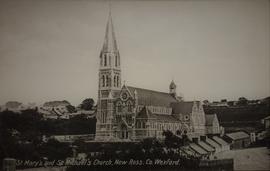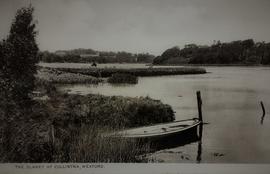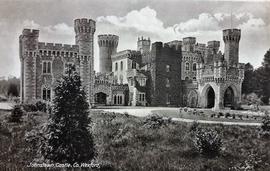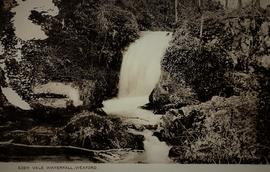A postcard print of the exterior of St. Mary's and St. Michael's Church in New Ross in County Wexford.
A postcard print of the River Slaney at Cullintra in County Wexford.
A postcard print of the exterior of Johnstown Castle in County Wexford.
A postcard print of Edenvale Waterfall near Castlebridge in County Wexford.
Draft articles for submission for 'The Capuchin Annual'. The author of the texts is not given but it is possible they are by D.L. Kelleher (1883-1958). The titles include ‘Walking into Wigan Town in 1920’, ‘Traveller’s Joy / The Return of the Native’, ‘Paris / July 5th 1926’, ‘Saint Peter’s and Saint Paul’s, Cork’, ‘Pageant in High Street’, ‘I like Dublin’, ‘Shakespeare in the Cradle’, and ‘Lourdes / November 18th 1923’. It appears that many of the articles are incomplete.
Draft of an article by D.L. Kelleher (1883-1958) titled ‘Armagh City / First Impressions’, published in 'The Capuchin Annual' (1943).
Copy letter from Richard Mulcahy to the Most Rev. Michael Fogarty, Bishop of Killaloe (1859-1955), regarding apparent misrepresentations re the revolutionary period in a book by the historian, P. S. O’Hegarty (1879-1955).
Article by Edward A. Harrigan titled ‘A Bishop comes home’. The article refers to Bishop Edward J. Galvin (1882-1956), the founder of the Missionary Society of St. Columban, and the first Bishop of Hanyang, China.
Letter from ‘Kitty’ enclosing clippings from the 'Cork Examiner' (9 July 1938) re the handover by the British military of Spike Island in Cork Harbour under the terms of the Anglo-Irish agreement. The articles also refer to the escape of Irish republican prisoners from Spike Island in 1921. The letter is addressed to ‘Joe’ but also refers to Fr. Henry Anglin OFM Cap. It is dated 6 Jan. 1956.
Article by H. Manny titled ‘Synge, his critics and himself’.




